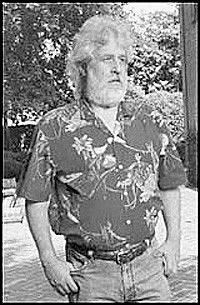I was stunned and saddened to learn on Saturday night of the death of Richard Fields, a pedigreed civil rights attorney who had toiled relentlessly for many years to bring the two major races of these parts into some kind of parity to make up for eons of official and unofficial injustice perpetrated by one upon the other.
My grief, if that’s the right word for it, was not because I ever considered myself a friend of Fields. I knew him first by reputation and then as a news figure and sometime source whose work affected my main beat, politics, and then as an acquaintance I would sometimes run into at gatherings and public events. My colleague John Branston, who has written splendidly and comprehensively about Fields, knew him far better. (See his 2001 Flyer article, “The Man Behind the News.”)
The fact is, I was one of an increasing number of people locally who could respect, even admire much of what Fields had done but — to say it outright, if mutedly — were taken aback and estranged by what he seemed to have become or, even if involuntarily, were forced into a clash with him.
Let’s just say he had issues, dormant during his legal heyday, that loomed larger in his personality in recent years. Some of them stemmed from his apparent decision — at some point in the late ‘90s — that he was meant to be a kingmaker, influencing elections and political outcomes instead of, or side by side with, correcting injustices.
The ancient Greeks coined a term for this kind of presumption, and the errors and imbalances of self and temptings of fate it entailed: hubris.
This is not the venue to list what might have been Fields’ derelictions, many of which he answered to in the form of ignominious defeats in two bumbling runs for public office (School Board and state Senate), in a state Supreme Court censure here or disciplinary bar actions there, or in or two separate expulsions from the local Democratic executive committee.
(At least one of the latter was attributed by supporters to an act of principle: i.e.,his legal work, alongside Republicans, against seating a Democratic legislator, state Senator Ophelia Ford, amid evidence of fraud in her election.)
He also strained and even ruptured friendships, some of which had been monumentally important to him — like that with former Mayor Willie Herenton, whose rise to power he had been instrumental in, even if not to the degree that he liked to suppose.
In the course of trying to influence Herenton against running for a fifth term and to broker a succession, this meticulous and unabashedly judgmental lawyer was accused of having slipped over to the wrong side of the law himself in an entrapment scheme, a circumstance he would strongly deny and, in any case, was never tried for.
Fields saw himself, not always accurately, as being on the side of the angels. He certainly had more than his share of courage, and in basic, institutional ways he could see clearly the difference between right and wrong and try to get others to see it — nay, make them see it by force of law. If he had trouble coming to the same distinction about his own conduct, he most surely was not the only human being so afflicted.
I own up to having written some articles about Fields in recent years that, let us say, tried to redress the over-glowing image he had of himself. And I remember being approached by one of his closest legal and personal friends and tensing up, thinking I was about to be reproached. “Thank you,” the man said instead, and it was then that I realized that some of those who regarded Richard Fields most fondly were concerned that, for his own sake, he be redirected back to his center — by public writ or therapeutic means, if need be.
Let us revisit that center: Richard Fields, who came here from California in the late ‘60s to work on behalf of the ambitious War on Poverty programs of the time, even as those programs were losing steam, stayed around to try to finish on his own the impossible tasks they had envisioned.
After earning a law degree, he set out to be a scourge of established privilege, litigating to desegregate schools, protect the impoverished from exploitative developers or unscrupulous businesses or negligent officialdom , secure better living conditions for working-class folks, and in general to be the kind of public gadfly that an accused Socrates once proudly owned up to being. He was a mainstay of the NAACP when that organization needed someone most.
In the course of it all, he endured, or perhaps even invited, sacrifices in his personal life, as how could it be otherwise?
Let me be clear about something: I don’t rejoice when the Reaper comes calling on anybody, and I particularly lament the way in which Richard Fields met his fate — hit by a car while crossing a busy Midtown thoroughfare at high noon.
At this writing, we still don’t know much about the accident, though both the motorist’s statement on a police report and an interview with a bystander featured on local television suggest that Fields may have walked directly into the stream of traffic, oblivious to danger.
Whether or not it’s accurate, I see him doing so with a cell phone attached to his ear, working an angle, still on the case at age 65, still trying to right some wrong, real or imagined, and not noticing, or feeling for very long, what hit him. There are worse ways to go, but, still, it’s a shame.


 jb
jb 
 Jackson Baker
Jackson Baker